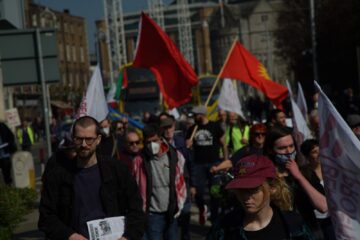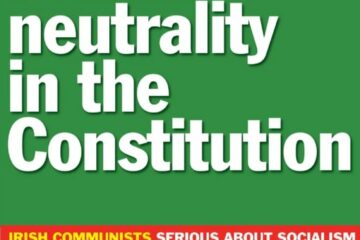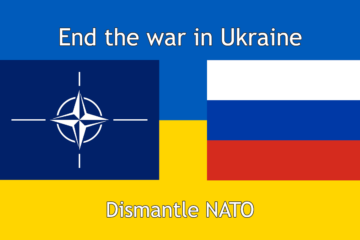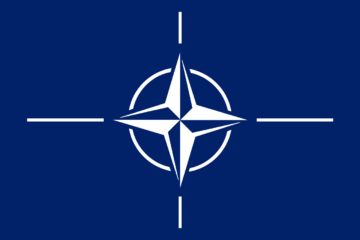National Executive Committe, Communist Party of Ireland
June 2016
At the June meeting of the National Executive Committee of the Communist Party of Ireland, while the main business was the continuing preparation for our 25th Congress, the Executive discussed the current political situation.
The meeting evaluated the election results for both Dáil Éireann and the Northern Ireland Assembly, with the establishing of a new coalition government made up of Fine Gael and a number of “independent” TDs, with the active support of Fianna Fáil, while the Northern Ireland Executive has been made up of two of the previous four parties, the SDLP and Official Unionist Party deciding this time to go into opposition, leaving Sinn Féin and the DUP to form the new Executive.
The results from both elections only confirm a continuation of the same failed anti-worker policies. Austerity will remain the order of the day. The Irish government will continue to impose austerity, backed up by the EU, while the Executive in Belfast will continue to carry out policies imposed from London.
It is a welcome development to see the election of additional left and progressive TDs and MLAs.
The long-drawn-out dance between Fianna Fáil and Fine Gael was nothing more than a game of pretence, both sides pretending that there are some fundamental differences between them when in reality there is little of real substance. Both agree to austerity; both avow unbending loyalty to our EU overseers.
The deal cobbled together regarding water charges is one reflective of Fianna Fáil’s continuing effort to rebuild itself as a party of all the people, a party in the social-democratic sphere. Their strategy regarding water is clear, and that is to play the long game, securing the suspension of charges for three years but to continue to install water meters. They hope they can break and defuse the popular resistance against these charges, holding out the promise that meters are only for conservation, that everyone will get a free allowance of water, then pay only if they exceed that allowance.
Workers should be mindful of the experience with service charges in relation to refuse collection. All waivers are now gone, charges are going through the roof, and the recycling bin is now subject to charges. We are feeling the effects of full “cost recovery,” or massive profits for private companies. This is what will happen if the Fine Gael government, supported by Fianna Fáil, is allowed to pursue its agenda.
The suspension of water charges is a significant victory for the people’s campaign but one that may be short-lived if it is not built upon. The CPI once again calls for maximum political pressure to be applied to ensure that the people’s ownership of water is written into the Constitution of Ireland. The party will be running a campaign throughout the country to mobilise support for this crucial demand, which has widespread public acceptance, as a block to the privatisation of water, which is clearly an unspoken part of the plan.
The Belfast Executive has met and shared out the ministerial portfolios and presented its draft ideas on budget strategy, proposing to sell it by having a series of “public consultations.” While we are in favour of maximum public involvement in all decisions that affect the lives of working people, this appears to be nothing more than a ruse, established to create the illusion of the people having a say and being the final arbiters of budget policy.
There is a need to see the establishment of a genuine representative Civic Form, as agreed under the Belfast Agreement, and not the one hinted at by the Executive, of some sort of “technical support” forum, allowing for a further retreat and an acceptance of austerity by forces that at present claim to be opposed to the British government cuts. Let them either accept their accountability or admit their impotence.
The party also reiterated its call for people in the North to vote Yes to British withdrawal from the European Union. People should not make their choice according to who shouts the loudest, those who are mired in racism and xenophobia. The ruling elite may be split on which direction the British state should now take, but both sides of this debate are deeply imbued with racism, all hanker after past imperial glories, both have supported and do support wars of aggression.
The workers’ movement must take whatever advantage it can of these divisions both within the ruling class in Britain and within the strategic alliance of monopoly capitalism at the EU level. A breach in that alliance can create new conditions throughout the EU, and help weaken the continuing attacks being directed by the institutions of the EU and national governments against working people throughout the continent.
The CPI welcomes the vote by NIPSA to support Britain’s exit from the European Union. That it was carried by democratic vote is also to be welcomed, an example and procedure that other trade unions should follow.
We express our solidarity with the working people of France and Belgium, who are mobilising to defeat new anti-labour laws.
It is indeed ironic to see the Irish establishment actively campaigning for Britain to remain within the EU and interfering in the internal affairs of the people in another member-state while the British government actively encourages them to do so—an Irish government that is in hock to and controlled by the EU, a government and political establishment who have sold out Irish sovereignty and democracy for a few crumbs, and who willingly took on 40 per cent of EU banking debt, turning the Irish people into debt slaves.
What is now more important than ever is the need to build and deepen the people’s resistance against austerity, to challenge both the Irish government and the Belfast Executive, and hold them accountable.










